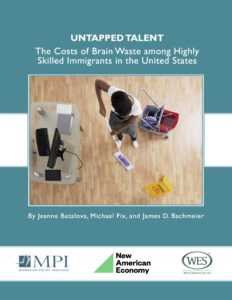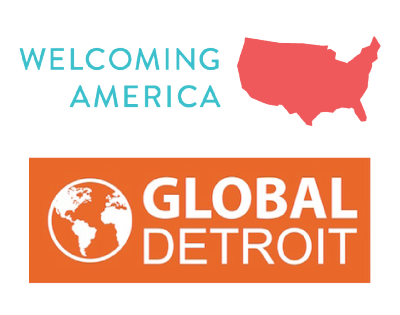Rust Belt Innovation Leads U.S. Efforts to Utilize Untapped Immigrant Talent
 “Human capital is the ultimate capital,” notes Demetri Papademetriou, Distinguished Senior Fellow and President Emeritus of the Migration Policy Institute (MPI), a Washington-based think tank dedicated exclusively to the study of international migration. On December 7, MPI unveiled groundbreaking research in a new study, Untapped Talent: The Costs of Brain Waste among Highly Skilled Immigrants in the United States. In introducing the research, Papademetriou concluded that “Brain waste is the ultimate waste.”
“Human capital is the ultimate capital,” notes Demetri Papademetriou, Distinguished Senior Fellow and President Emeritus of the Migration Policy Institute (MPI), a Washington-based think tank dedicated exclusively to the study of international migration. On December 7, MPI unveiled groundbreaking research in a new study, Untapped Talent: The Costs of Brain Waste among Highly Skilled Immigrants in the United States. In introducing the research, Papademetriou concluded that “Brain waste is the ultimate waste.”
Brain waste, or skills underutilization, is defined by the research to be the incidence of college graduates who cannot fully utilize their skills and education in the workplace despite their high professional qualifications.
MPI’s research concludes that skilled immigrants and refugees in the U.S. (possessing a college degree or more) are significantly more likely than their U.S.-born counterparts to be unemployed or underemployed, documenting that some 1.9 million (or 25%) of the 7.6 million university educated immigrants and refugees fell into this category between 2009-2013. Nationally, immigrant brain waste cost $39.4 billion in lost annual earnings and $10.2 billion in lost annual taxes from underutilization of this talent. The study represents the first research to ever quantify these direct impacts.
The research included a more detailed dive into the impacts of brain waste in seven states, including Michigan and Ohio. Both states suffered $510 million in lost annual earnings and nearly $50 million in lost annual state tax dollars from brain waste. Remarkably, despite significant struggles in the Michigan and Ohio economies during the period of study (2009-13), immigrant brain waste was found to be below the national average in both states and roughly equal to the underemployment and unemployment of their U.S.-born college educated workers in these states. There are many factors that explain this, including a higher proportion of Michigan and Ohio’s immigrants on work visas, a higher proportion of advanced degrees, a higher likelihood of obtaining a degree from a U.S.-based university, and stronger English skills.
The insights from the research are deep and worth investigating. For example, the proportion of recent immigrants and refugees who come to the U.S. with a college degree has been significantly rising and is at 48% (for the years 2011-15) compared to 33% among those arriving before the 2007-09 recession and 27% of those who arrived before 1990. Such insights suggest that now, more than ever, it is important for states and localities to address brain waste.
MPI hosted a webcast event for the December 7 release of the brain waste study. MPI researchers Jeanne Batalova and Michael Fix were joined by WE Global Co-Chair Steve Tobocman and Amanda Bergson-Shilcock, Senior Policy Analyst of the National Skills Coalition, and former Vice President of the Welcoming Center for New Pennsylvanians, a WE Global core member. Steve discussed the policy and program steps taken in Michigan to address brain waste, including Governor Snyder’s Michigan International Talent Solutions program, state licensing guides to assist foreign-traded and educated workers in attaining their professional licenses and credentials, new state ESL funding, and Global Detroit’s Cultural Ambassadors program. He noted the partnership with Upwardly Global that has helped the state develop leading-edge programs that have connected 59 unemployed and underemployed skilled immigrants with jobs, raising average annual earnings by more than $42,000 for each client and nearly $2 million collectively since programs launched two years ago.
Amanda discussed how important it can be to help skilled immigrants and refugees enhance their English skills, build professional network development and social capital, and access mid-career internships. She urged the crowd to not gloss over the issues of race that are documented in the MPI study. Finally, Amanda noted the opportunities that exist within the federal Workforce Investment and Opportunity Act to use federal dollars to address this issue.
The MPI study was conducted in partnership with the New American Economy and World Education Services. It should provide advocates with the ability to quantify the negative impacts in terms of lost earnings and state and federal tax dollars. If talent and human capital is the 21st Century economy’s most valuable asset, then state and local economic development practitioners, workforce development programs, and public policymakers ought to take heed. Otherwise they are leaving untapped talent, earnings, and tax dollars on the table.



